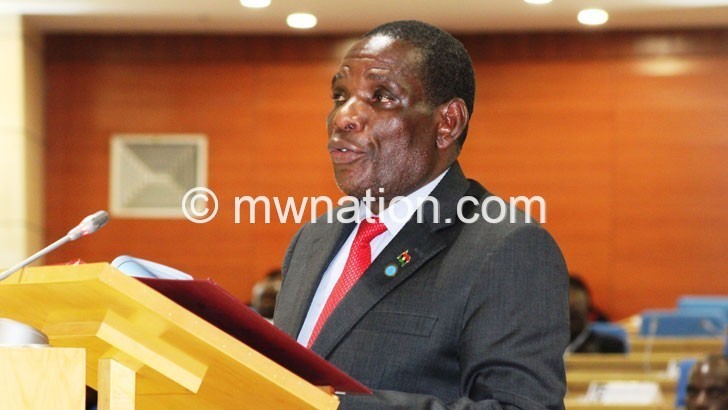Tonse balloons PSs wage bill
The Tonse Alliance administration has increased the number of principal secretaries (PSs), ballooning the annual wage bill for the mainstream civil service top-tier by around K300 million and running a fleet of vehicles costing over K1 billion, Nation on Sunday has established.
Currently, there are 12 more PSs than they were during the Democratic Progressive Party (DPP) administration, with the increase down to a bloated Cabinet and administrative changes.

President Lazarus Chakwera increased Cabinet portfolios from 18 to 23, meaning five new PS positions were created. Additionally, the Ministry of Education now has two PSs—one for education and another for administration.
The Tonse Alliance administration also replaced six PSs, who have been deployed to the Office of the President and Cabinet (OPC) to handle “special duties”. Some of them confided in us that they “literally do nothing”.
According to the Department of Human Resources Management and Development (DHRMD), each PS earns around K22 million per annum, of which K17 million is salary, and K5 million fuel allowance.
Each PS is entitled to an official vehicle—a Prado TX valued between K100 million and K110 million—according to Toyota Malawi prices, meaning the 12 extra PSs have been designated a fleet valued at over K1 billion.
DHRDM public relations officer Kennie Ntonga said the department does not have details pertaining to the actual number of PSs.
“In simple terms, each ministry has one PS, who is the controlling officer. Their number can, therefore, be determined by the number of ministries. However, PSs are pegged at Grade C, and in government we have almost 44 officers at that Grade. But not all are PSs.
“DHRMD’s main area of focus is grades and numbers. But for the actual figures serving as PSs the OPC would be in a better position since they are responsible for deployment of PSs and other common administrative service,” he explained.
Meanwhile, DPP parliamentary spokesperson on Finance Joseph Mwanamvekha has described the government as inefficient and negligent.
“We are very worried and disappointed with the increased PSs. Manifesto of Malawi Congress Party promised to be efficient in utilisation of funds. What is happening is contrary. That is total negligence and total inefficiency,” he said.
Mwanamvekha said at the time the country was struggling economically, the government was supposed to be cutting “unnecessary expenses.”
“Revenues are low and the government is struggling to provide quality services in sectors such as education, health and energy. It is shocking that the government has chosen to misuse resources,” he said.
The former finance minister said the best way was for the government to maintain in the system the six PSs that have been dumped at OPC.
“We know they were dumped based on perceived political connections. These are technocrats and it is wrong to victimise them based on politics. A decision to freeze them is draining public resources,” he said.
Mwanamvekha said he was planning to meet the Ministry of Finance and Public Accounts Committee of Parliament to seek answers on the PSs growing numbers.
In 2015, the government reduced the PSs in mainstream civil service to below 20 as part of the Public Service Reform Programme.
The bloated number of PSs has been cited as one of the major causes of public service inefficiencies and a drain on public resources.
Economic analyst Milward Tobias said Malawi’s economy is too small for a “bloated PSs and Cabinet”.
“Malawi is a small economy to be having all those PSs. The reforms were supposed to reduce such positions. It is unfortunate that this government has decided to increase the number of PSs,” he said.
“The size of government is too huge. In fact, we don’t need deputy ministers. All we need are less than 20 PSs and 15 Cabinet ministers.”
Tobias, however, backed the government’s decision to eject the six PSs from the mainstream government operations, arguing that some were politically appointed.
“Some of those were appointed due to political connections. Instead of promoting civil servants that are already in the service, the trend here is that a new administration always brings in people that don’t have an idea how to be PSs,” he said.
“Sadly, this is what the Tonse Alliance administration has adopted too. When another administration comes in, it will do the same. It is a sequence of one leader creating new mess for his successor,” he added.
After taking over in June last year, the Tonse Alliance administration also fired some PSs and seconded others to other institutions. Among them is former PS for Health, Dr Dan Namarika , who has been moved to College of Medicine.
Those dumped at OPC include former Education PS Justin Saidi, Henry Njoloma (Water) and Grey Nyandule-Phiri (Agriculture).
PS for administration in the OPC Cliff Chiunda said he could not immediately detail the roles of the PSs moved to the OPC and justify their being maintained in the service.
In April, last year, Nation on Sunday also highlighted that six PSs in the DPP government were enjoying benefits meant for the post of deputy chief secretary, an expensive arrangement that contradict the reforms agenda.
The Office of the Ombudsman questioned the promotions, which were described as discriminatory and promoting unfair labour practices.





